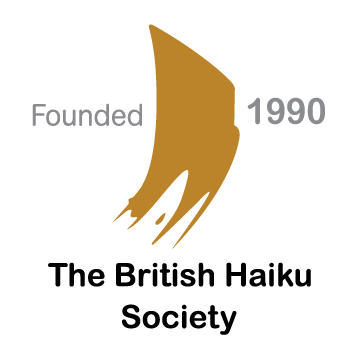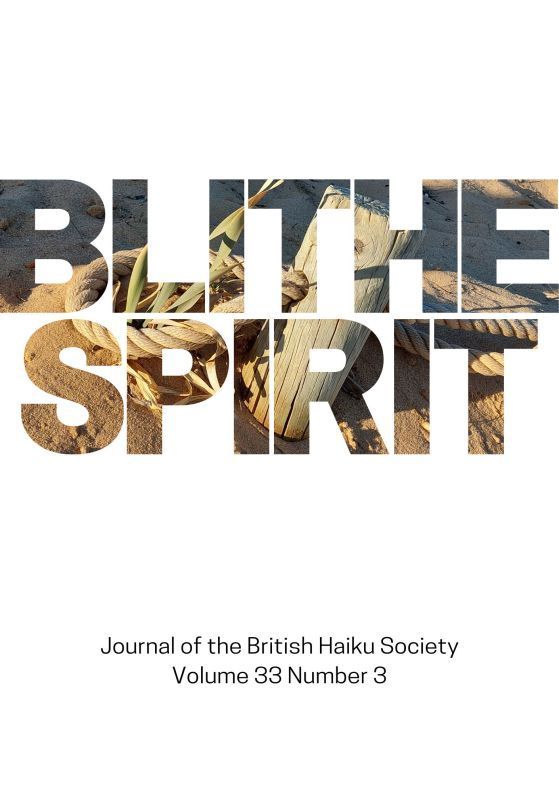
Journal
Blithe Spirit, our journal, is a Quarterly, with the cover dates of February, May, August and November to some extent reflecting the season just ended, i.e. the February issue contains a section of winter haiku, etc.
The name of the journal was suggested by our first President, James Kirkup, as a tribute to the great British haiku scholar, R H Blyth, to imply the spirit in which we hope to go about our art, and to suggest that haiku belongs in the poetry world, with a gentle nod towards Shelley’s skylark.
Each issue usually consists of around 100 pages, with original poems covering the gamut of haikai genres, a diversity of articles about the writing and appreciation of haiku and related forms, book reviews, letters to the editor, features and announcement of the winner of the Museum of Haiku Literature Award (£50) for the haiku chosen as best from the previous issue.
Our editorial policy is to encourage new writing, value a diversity of approaches to haiku, and promote excellence. Blithe Spirit only accepts submissions from BHS members, however, members do not have an automatic right to publication. All submissions should be original work, not previously published in print or on social media, and under no consideration elsewhere. Please DO NOT SHARE work accepted for publication in Blithe Spirit until the journal has been published.
From its inception the British Haiku Society has always maintained certain key principles in line with traditional haiku values. These can be expressed thus: a haiku should derive from spontaneous, concrete, personal experience in a certain moment of heightened awareness; when putting such an experience into words regards should be had for a certain mellifluity – a haiku should flow easily – a careful choice of words should aim for what Martin Lucas called ‘poetic spell’.
It should be clear that the writer has contrived to observe something which usually escapes ordinary notice, helping the reader to have a feeling of what William Carlos Williams called ‘the renovation of experience’.
Here are some suggested guidelines:
• The fundamental driving force in haiku sensibility is to discover delight in the ‘ordinary’ – that which usually escapes everyday attention
• A present moment is represented by simple words on the page
• Sensitivity to language, rhythm and structure should be evident
• The reader should feel a presence in place and seasonal flux
• The space between observer and whatever is being observed reduces to a minimum; intellectual thoughts should not intervene
• A haiku creates a space for the reader to make their own sense and have their own feelings
• The use of simple, unsophisticated images comes without explanation
• Feelings & emotion are implied rather than expressed
• Sophisticated cleverness is to be avoided
• Some implied human resonance in juxtaposition to natural events makes a haiku have some more universal relevance
• A haiku often subtly shifts direction by a managed juxtaposition of two things
• References to modern phenomena such as computers and social/political events are perfectly acceptable provided a personal agenda is not overt
This is not a sine qua non checklist; the recommendations need to be internalised so that they inform haiku production in an other-than-conscious kind of way.
All these things apply, turn and turn about, to related forms appearing in Blithe Spirit, haibun and tanka, etc.
Please send haiku, tanka, haibun, sequences, linked forms, articles, reviews & any other enquires to the editor, Iliyana Stoyanova:
The address for postal submissions will be provided in the members’ newsletter the brief sent to the membership.
For those preferring to submit by post, please send a covering note and a stamped self-addressed envelope or one IRC if you wish for a reply.

Please have a look at this exciting piece of history – one of the first issues of Blithe Spirit from January 1992:
Sampler from – Blithe Spirit 27.4:
Sampler from – Blithe Spirit 28.3:
For the complete archive of previous editions of Blithe Spirit, visit our dedicated archive site at https://thebhsarchive.co.uk/

All views expressed on The British Haiku Society website are the views of the authors and contributors.
They do not necessarily reflect the views and opinions of The British Haiku Society.
Find us on Facebook and Instagram!